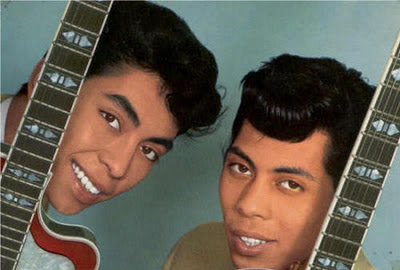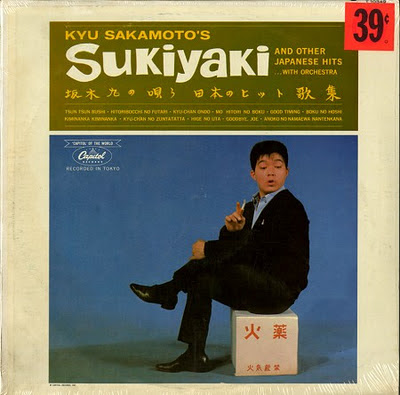The original hit version of this song, sung in Japanese by Kyo Sakamoto, is one of my all-time favorite oldies. This version is sung in English, but it is not even close to a translation of the original.
The Blue Diamonds are an example of Indo-Rock. At one time, Indonesia was a Dutch colony. This is music made by the people of Indonesia, but influenced by the rock and roll hits coming out of America. The group was centered on two brothers, Ruud de Wolff, born on 12 May 1941, and Riem de Wolff, born on 15 April 1943. Both boys were born in Jakarta, Indonesia, although Jakarta was called Batavia back then.
They had a lot of success covering hits by The Everly Brothers. Their biggest hit was Ramona, a cover of a song that was written for a 1927 movie starring Dolores del Rio. She never actually sang the song in the movie, but she did sing it at promotional appearances. Ramona was a #1 hit for The Blue Diamonds in 1960 in both Holland and Germany, and a #2 hit in Belgium and Norway. It sold an unprecedented 250,000 copies in the Netherlands, and over one million copies in Germany, where a German version was heard. The English version even made it up to #72 on the Billboard Hot 100 in America. They even recorded a Spanish version of the song that became a big hit in Spain, Mexico, and elsewhere.
Besides playing in Indonesia, they toured all over the world in the 1960’s, including Europe, Malaysia, Japan, Hong Kong, Singapore, Sri Lanka, but never in America. They continued performing until November 2000. Ruum passed away only a month later at the age of 59.
Here’s Sukiyaki sung in English by The Blue Diamonds on London 10032 from 1963:
For comparison, here’s the hit version heard in the United States. To say this song was a smash hit is a serious understatement. It went to #1 on both Billboard’s Hot 100 and Cashbox. It was a #1 crossover hit on the Adult Contemporary charts, and it even climbed to #18 on the R&B charts in America! It peaked at #4 in Canada on the 1050 CHUM survey in Toronto. It was #2 in Australia in Germany, and #6 in the UK. The biggest success, of course, was in Japan. Once when I was demonstrating MusicMaster at a trade show in Las Vegas, I was playing this song in our booth. Some Japanese businessmen were passing by, and they stopped to listen to the entire song before walking on.
Kyu was actually a nickname. It means “nine” in Japanese, which was an alternative way to read the kanji character that represented his given name, Hisashi. Kyu had a pretty tough life. He was forced to migrate from his home in Kawasaki, Kanagawa Prefecture, to escape American bombing of Tokyo during World War II. His parents were divorced while he was still attending junior high school. He played trumpet in his high school band, and joined a Japanese pop group called The Drifters in 1958 as a singer. The song we know as Sukiyaki was actually called “Ue O Muite Arukō” and it was written by Rokusuke Ei and Hachidai Nakamura. The owner of Pye Records in England was visiting Japan and heard the song. He decided to bring it back to England, changing the name to Sukiyaki to make it easier for English speakers to pronounce. Kyu got married in 1971 to a Japanese actress named Yukiko Kashiwagi and they had two daughters, Hanako and Maiko.
Sadly, Kyu Sakamoto died when JAL flight 123 from Tokyo to Osaka crashed on 12 August 1985. All 15 crew members died. There were 509 passengers on that flight. Only four people survived. Kyu was only 43 years old at the time.
Here’s the version heard in America of Sukiyaki by Kyu Sakamoto on Capitol 4945 from 1963:
If you want to sing along (I do), here are the Japanese lyrics. Below that, I’ve included the actual English translation. As you can see, it’s clearly quite different from the version sung by The Blue Diamonds.
Japanese Lyrics:
ue o muite arukou
namida ga kobore naiyouni
omoidasu harunohi
hitoribotchi no yoru
ue o muite arukou
nijinda hosi o kazoete
omoidasu natsunohi
hitoribotchi no yoru
shiawase wa kumo no ueni
shiawase wa sora no ueni
ue o muite arukou
namida ga kobore naiyouni
nakinagara aruku
hitoribotchi no yoru
(whistling)
omoidasu akinohi
hitoribotchi no yoru
kanashimi wa hosino kageni
kanashimi wa tsukino kageni
ue o muite arukou
namida ga kobore naiyouni
nakinagara aruku
hitoribotchi no yoru
(whistling)
English Translation:
I look up when I walk so the tears won’t fall
Remembering those happy spring days
But tonight I’m all alone
I look up when I walk, counting the stars with tearful eyes
Remembering those happy summer days
But tonight I’m all alone
Happiness lies beyond the clouds
Happiness lies above the sky
I look up when I walk so the tears won’t fall
Though my heart is filled with sorrow
For tonight I’m all alone
(whistling)
Remembering those happy autumn days
But tonight I’m all alone
Sadness hides in the shadow of the stars
Sadness lurks in the shadow of the moon
I look up when I walk so the tears won’t fall
Though my heart is filled with sorrow
For tonight I’m all alone
Thanks for listening to MusicMaster Oldies. I’m trying to build up a bigger audience, so please let your friends who are fans of the oldies know about it. Thanks!


